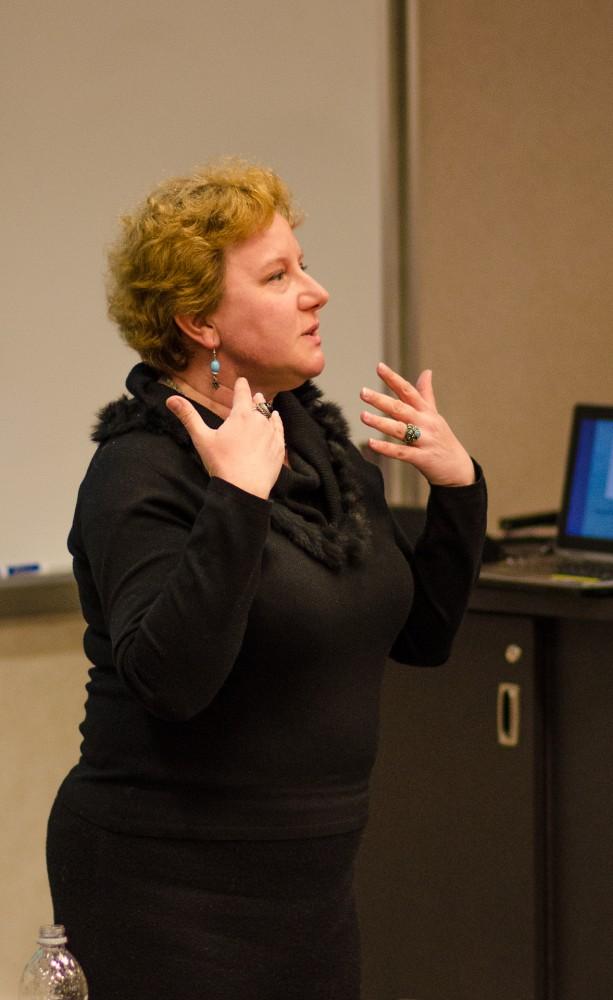ECS discusses faculty collegiality

GVL/Bo Anderson Figen Mekik speaks at the ECS meeting
Apr 7, 2013
Grand Valley State University’s Executive Committee of the Senate approved a motion sending the concept of faculty collegiality and its role in the faculty handbook to the University Academic Senate for discussion at its next meeting.
New language attempting to clarify collegiality in section 3.02 of the faculty handbook was presented by Kurt Ellenberger, chair of the Faculty Personnel Policies Committee, at the ECS meeting on April 5. ECS placed the issue on the next UAS agenda without recommendation for approval so that it can be further discussed.
Collegiality is understood as civility, mutual respect and working constructively with other faculty members, but senators raised concerns that the term is subjective and difficult to measure. They also mentioned that many universities have removed any sign of the word from their handbooks due to legal issues.
Ellenberger anticipates the creation of a taskforce committee that may include individuals from the Office of Inclusion and Equity, Human Resources and of the FPPC, which could be charged with clarifying the term collegiality and looking into bullying language.
There hasn’t been discussion about removing the collegiality section, Ellenberger said, rather the intent of the new language was to put focus on positive interactions between faculty members.
Senators also asked about incorporating collegiality into tenure and salary evaluation standards for faculty, but Ellenberger said nothing would change that isn’t currently in place.
“(Current language) does say that you can apply collegiality, although it says it in kind of an awkward way, along with these other things,” he said. “This, again, just accentuates the positive aspect of working together constructively as faculty.”
Robert Hendersen, chair of the psychology department, said he liked that the new language clarifies that collegiality isn’t a separate evaluation criterion for faculty and that it emphasizes positive interactions, but he thinks collegiality could be still dangerous if misused.
“Someone whose work, for example, is highly controversial (within their department), and where there are people who feel this person just isn’t listening and isn’t engaging in a kind of constructive argument, this becomes dangerous when included in a personnel policy at a university, which should be a sanctuary for free and open academic discourse,” Hendersen said. “Academic discourse we hope will be settled, and yet sometimes it isn’t always because people are discussing things in which they are very much involved.”
Charles Pazdernik, chair of the department of classics within the College of Liberal Arts and Sciences, stated his position on the language.
“What putting this in the handbook does (is) it brings these things that we all agree are subliminal and often not expressed directly, into the light of day,” he said. “It seems to me that we’re reducing rather than expanding the opportunity for people to discover code words to perform the kind of character assassinations that we’re afraid of here.”
There are people who might abuse their power, Pazdernik said, but for those individuals accused of not being collegial, the opportunity to question the accusation still exists.
“This is an improvement upon what I think we all agree is an inherently ambiguous set of circumstances,” he said.
Gayle Davis, provost of academic affairs, said if someone is accused of not being collegial the situation is more than a one-on-one conversation between the people involved.
“If you’re not being collegial, if you’re a pain in the neck to be around and you’re always yelling at everyone, then the work of your unit gets delayed at least, if not curtailed, and that’s in the university’s interest,” Davis said. “Not being well-liked (or) not being disagreed with, but stymying progress has been one of our biggest problems.”
Also discussed at the ECS meeting was the new Masters of Philanthropy program, which is nearing completion.
Salvatore Alaimo from the school of public, nonprofit and health administration was one of the co-authors of the program. Alaimo said they were waiting for one final course, which already exists in the management program, to be approved by the University Curriculum Committee.
“It’s a course that they have already taught, but they’re altering it to accommodate our students to be joined in the classroom with theirs, so it’s really a course change not a new course,” Alaimo said.
ECS discussed the new program and placed it on the April 19 UAS agenda, but little can be done until UCC approves the course change.
“This program is four years in the making, (with) nine versions,” Alaimo said. “If we don’t get this done now, we can’t post in the fall to hire (for) the following fall. And we’ve hired both in the fall and in the winter, and let me tell you, the pool of candidates in the winter is very slim.”
The next ECS and University Academic Senate meeting will be April 12 in the DeVos Center on GVSU’s Pew Grand Rapids Campus.
[email protected]

























